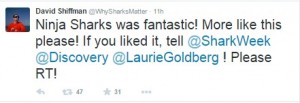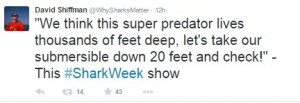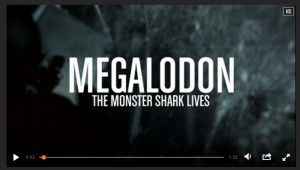Shark Week: Honesty in Content Marketing
It’s the most wonderful week of the year! Personally, I’ve loved Shark Week since I was a little girl. I planned for most of my youth to be a marine biologist before writing stole my heart. I’m not alone in my fascination. The public is amazed and transfixed by them (including the derpy species, Left Shark). Sharks are amazing creatures, and I think we’re afraid of them because we don’t fully understand them yet. The solution is obvious: educate the public to give them a better understanding and reduce the panic to a healthy respect. Shark Week has expressed the desire to do this, but the “mockumentaries” and fear-based programs of fake footage they showed during prime time hours conveyed a very different message. Shark Week has failed the public (and the sharks) during the past few years due to their lack of honesty. Is this year different? If not, 2015 may be the year it comes back to bite them, and not just with an exploratory nibble on the leg.
Call it what it is: Sharknado vs. Shark Week
 How can we talk about Shark Week and not about Sharknado? Sure, they’re not necessarily affiliated, but to the public, they’re almost synonymous now, which is sad. Sharknado does not claim to be based in science or reality (obviously). It’s highly entertaining, wildly popular and successful, but if you’re upset about the quality of the CGI or it being unrealistic, you’ve completely missed the point. It’s not trying or pretending to be real; it’s not deceiving viewers. It doesn’t even take itself seriously, so you certainly shouldn’t read into it too much. Just enjoy it for what it is.
How can we talk about Shark Week and not about Sharknado? Sure, they’re not necessarily affiliated, but to the public, they’re almost synonymous now, which is sad. Sharknado does not claim to be based in science or reality (obviously). It’s highly entertaining, wildly popular and successful, but if you’re upset about the quality of the CGI or it being unrealistic, you’ve completely missed the point. It’s not trying or pretending to be real; it’s not deceiving viewers. It doesn’t even take itself seriously, so you certainly shouldn’t read into it too much. Just enjoy it for what it is.
Shark Week, however, is a different animal altogether. At least, it should be. It claims to be based in science, to come from a place of greater understanding and to bring that information to the public. The Discovery brand was established on science, curiosity and a search for truth. Nonetheless, in the past few years, actors have portrayed scientists, witnesses and victims, attempting to sell (literally) fear and hype to boost numbers. According to businessinsider.com, over 70% of viewers were misled to believe a prehistoric shark is still in existence after the airing of fake documentary, Megalodon: The Monster Shark Lives.
Wil Wheaton, who made a brief (and fantastic) appearance in Sharknado 2: The Second One, explained in a blog post why he felt Discovery Channel betrayed its audience. I’d go a step further to say they have also betrayed themselves. Their brand has been built up since its conception around honesty and real, scientific discovery. Shark Week programs like 2013’s Megalodon: The Monster Shark Lives and 2014’s Shark of Darkness: Wrath of Submarine discarded science in favor of completely false, misleading and speculative content in the hopes that it would be more entertaining like Sharknado.
Learn from Discovery’s mistake and call your content what it is. If it’s true and real, provide your sources to avoid scrutiny and be proud of it. If it’s a great work of fiction (there’s plenty of value to be had there too) then be proud of it. But don’t pretend fiction is non-fiction. Someone, somewhere will call you out on it, and then you’ll have some explaining to do.
 Losing an audience: The channel that cried “Shark!”
Losing an audience: The channel that cried “Shark!”
Discovery’s fearmongering programs came with a cost. Enormous backlash came from the scientific community and from critical viewers who saw past the CGI to the dollar signs in the eyes of the producers. Reactions from Shark Week 2013 and 2014 were mostly negative, although statistics were presented in a way that misrepresented truth (unfortunately, Discovery Channel seems to have a knack for that). Producers also deceived scientists who agreed to appear in documentaries with the understanding their presence and discussions would add scientific value to the programs. Instead, producers cut and pasted their interviews and misapplied them to other “mockumentaries” about mythical creatures that don’t actually exist. So in the pursuit of more thrilling entertainment, they betrayed their brand, their audience, real shark experts (who could have actually helped them) and of course, the sharks who are being killed out of human ignorance and fear.
Discovery’s ill-conceived strategy is sinking fast, and many fans are abandoning ship. Even I approached this Shark Week with more skepticism and less enthusiasm than ever before. Real-life marine biologist David  Shiffman (quoted in this video about the factual errors of Shark Week) took to Twitter and Facebook to voice his thoughts about the Shark Week pseudoscience strategy and to fact-check the programs live, then review the overall experience each day.
Shiffman (quoted in this video about the factual errors of Shark Week) took to Twitter and Facebook to voice his thoughts about the Shark Week pseudoscience strategy and to fact-check the programs live, then review the overall experience each day.
 Shiffman wants the truth to be presented to the public, and thus praises Shark Week and Discovery when they get it right (with recent specials like Alien Sharks, Tiburones: The Sharks of Cuba and Ninja Sharks) and calls them out when they misrepresent information or miss the mark. We can only hope they listen.
Shiffman wants the truth to be presented to the public, and thus praises Shark Week and Discovery when they get it right (with recent specials like Alien Sharks, Tiburones: The Sharks of Cuba and Ninja Sharks) and calls them out when they misrepresent information or miss the mark. We can only hope they listen.
 If they do clean up their act, I hope the audience isn’t already too jaded to believe them. When you send up the cry of Megalodon and Submarine so often, your audience may not listen when you come forward with real science.
If they do clean up their act, I hope the audience isn’t already too jaded to believe them. When you send up the cry of Megalodon and Submarine so often, your audience may not listen when you come forward with real science.
Will Shark Week sink or swim?
In January, Discovery named Rich Ross as the new President of the Discovery Channel. He’s more than highly qualified, and knows all about brand development in the entertainment industry, judging from his hearty resume of successful shows. Mr. Ross’s vision for the Discovery Channel (and Shark Week) includes more science and less speculation, with certainly fewer “mockumentaries.” But can he repair all the damage already done? Can he mend all the relationships that have been broken and add value back into Discovery Channel programs?
 So far Shark Week has been better this year. Including more science-based shows, more biodiversity being shown, fewer actor portrayals and only one mention of Megalodon (affirming it is, in fact, extinct). However, they have a long way to go to repair their brand and earn back respect and trust from their audience.
So far Shark Week has been better this year. Including more science-based shows, more biodiversity being shown, fewer actor portrayals and only one mention of Megalodon (affirming it is, in fact, extinct). However, they have a long way to go to repair their brand and earn back respect and trust from their audience.
Honesty is always a better marketing strategy than lying, misleading or deceiving an audience. Likewise, quality content is proven to establish credibility, build up a brand and even improve SEO rankings. Clickbate and fantastical content may or may not get a lot of traffic, but it is devoid of value, and ultimately offers no benefit to consumers.
The truth for Discovery is that sharks are already awesome, and quality, scientific content about them is going to receive a better reaction on their branded channel than “mockumentaries.” Discovery is learning this the hard way, and I suggest every company watch carefully and learn from their mistakes and subsequent struggle.
What do you think of Shark Week this year? Do you think Discovery Channel can earn back the credibility they’ve lost? Let us know in the comments!
Enjoyed this article? Read more from Charlotte.
Charlotte Stapp—Marketing Coordinator/Writer & Editor

 Losing an audience: The channel that cried “Shark!”
Losing an audience: The channel that cried “Shark!”

